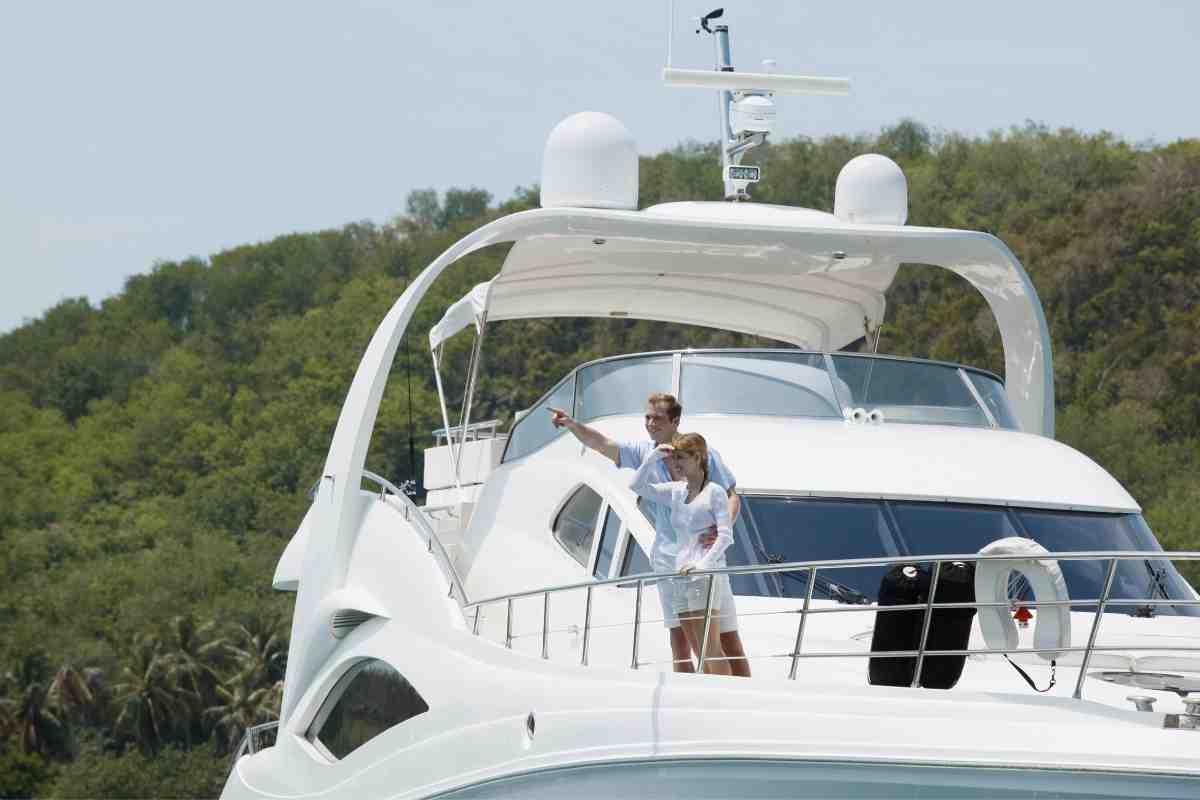If I Bought A Yacht Could I Just Live On It In International Waters? (Answered!)
If living on a boat brings freedom, then living in international waters outside of the rule of any country’s law is the ultimate freedom.

If I bought a yacht, could I live on it in international waters? You can live on a yacht or superyacht on international waters. There is nothing legally stopping you from doing so. However, you may still be subject to some laws and regulations.
If you’ve dreamed of the ultimate freedom of living out on the open sea free from the law of the country, here’s what you need to know about living on international waters and seasteading.
The Law Of The Sea: What is Seasteading?
Seasteading is like homesteading but at sea. This has been a concept since the 1960s. You will need to travel a fair distance from shore to be in international waters. All of the water up to this point is under different guidelines:
| Classification | Distance from shore | Laws |
| Internal Waters | Ports, bays, and shorelines of a nation | Subject to any local laws, fines, penalties, etc of the host nation |
| Territorial Waters | Up to 12 and sometimes as far as 200 nautical miles from the country’s coastline | The host country has exclusive economic rights to an area and has power over anything at or below the water surface |
| Contiguous zones | From 12 to 24 nautical miles out | Host nation is able to prosecute laws and send law enforcement and military onto to your vessel |
| International waters | Typically more than 24 nautical miles from a country’s coastline | This is a grey area, but typically travelers are held to the laws of that country or the flag they are flying under |
Why Consider Living on International Waters?
There are all kinds of reasons you may want to consider seasteading. The first and most obvious is the freedom.
You won’t have to worry about being governed by any laws and so long as you stay within the internationally agreed-upon code of behavior and don’t do anything that could be considered a violation of the United Nations, you and your crew members can more or less do what you want.

Here are a couple of other reasons that living on international waters may appeal to you:
- Avoid prosecution for a crime. If you’ve done something that your country of origin wants to prosecute you for and you are unable to gain refuge in another country, remaining in limbo out on the open water may be a solution. This could be an option not only for people who would typically be considered to be criminals, but also for people who have done something brave or altruistic that has offended their host country.
- Avoid taxes. Whatever you do on the high seas outside of national waters generally is not able to be taxed, since you are not in a particular country that could demand taxes when you do it. This can make international waters a tax haven for all sorts of income and activities.
- Work without a Visa. You may be able to work on a yacht or cruise ship on international waters even if you do not have a visa to work for the country the yacht is flying a flag for. This can open up employment opportunities and also enable the owner of the yacht to employ people that they may otherwise not be able to.
Advantages Of Living On International Waters
There are other ways to avoid prosecution for a crime, taxes, and most country laws aside from living on international waters, so why is the idea of living out on the open ocean so appealing?

Here are a few of the advantages of seasteading:
- Adventure. You may be able to take up residency on a small island or in a rural area and get some of the advantages of seasteading, but you’re likely to get bored quickly. Living out on the open ocean gives you a sense of adventure unlike any other.
- Travel. You can periodically enter into national waters and go on land while still receiving most of the benefits of living on international waters. That means that you can create a lifestyle of constant travel, exploring all of the countries of the world.
- Self-sustaining. With a large enough yacht, you can grow much of your own vegetables and other food and catch fish to feed yourself. Even with a relatively small boat, you can store seeds and sprout them for your greens. By using a sailing yacht, wind generators, and solar panels, you can be largely off the grid.
Potential Issues With Living On International Waters
Despite the apparent attraction of seasteading, it is not particularly common or popular.
It comes with some serious issues which cannot be disregarded:
Weather And Ocean Conditions
By definition, living out on international waters means that you are not within the shelter of any landmass. Once you arrive at an island, you will be under the jurisdiction of the country that that island belongs to.
This means that you are at the mercy of open ocean weather conditions. Conditions out on the open water can be extremely volatile.
Even a relatively small local storm can whip waves up into potentially dangerous heights. There is also nothing to break strong winds.
Without anything else to break the monotony of the ocean surface, your boat is typically the tallest thing around, which makes it a target for lightning.
All of this means that you will be at the mercy of the weather when out on the ocean.
While you can do your best to avoid the worst weather patterns by traveling, such as avoiding places prone to hurricanes during hurricane season, the fact remains that the longer you’re out on the water, the higher the probability that you will encounter serious weather conditions.
Supplies And Maintenance
You can come pretty close to being self-sufficient when out on the open ocean, but the time will inevitably come when you need to restock.
The larger and better equipped your yacht, the less often you’ll have to go to a port, but even the biggest ships need supplies.
Resupplying may be as simple as bringing a smaller vessel into shore if you are personally avoiding national waters but traveling with people who can go into national waters. However, there will be times when maintenance needs to be done on your boat.
Painting the bottom usually needs to be done at least yearly or every few years. For this, the boat will need to be hauled out, which requires a marina and can’t be done on the open ocean.
Inevitably, there will be periods of time when you need to go into shore. For many people who are seasteading, going into shore for a couple of days poses no problem at all and is part of the attraction of this lifestyle.
For other people, going into shore may be exactly what they’re trying to avoid.
Grey Areas In The Law
It is a misconception to assume that there is no law on the open ocean. While an individual country may not govern international waters, there are still laws in place.
International waters are divided into areas and nearby countries may have particular rights in those areas.

Agreements between the various nations that border a particular area of water regulate what happens on the water in that area.
Furthermore, you need to fly under the flag of your host country when you are on international waters.
You do not get to declare yourself free of your host country when you set sail.
Therefore, you will be regulated under your country’s maritime law. The United Nation also has a lot of power on international waters.
There are a number of things that may be regulated under one or more of these laws even on international waters, including:
- A crime that may have occurred in a country that has stakes in an international water area or a crime that affects a country that has stakes in these areas.
- Either a guilty party or a victim is a legal citizen of a nation that intends to press charges
- A crime is committed that threatens a given nation
- Genocide, terrorism, or war crimes
If You Are Born In International Waters, What Country Do You Belong To?
Want your little explorer to have dual citizenship? You may be able to achieve it by going into international waters, but not necessarily. Typically, a child has citizenship in whatever country the mother is a citizen of.
However, the child may also have a right to citizenship in the countries bordering international waters. The case would have to go through court, and citizenship would certainly not be guaranteed.
You Can Live On A Yacht In International Waters
It is entirely possible for you to live on a yacht in international waters, free of many of the restrictions and requirements of an individual country.
However, it isn’t always as straightforward as this, and you may find you are more restricted on international waters than you expect.
Frequently Asked Questions
What are the regulations for living on a yacht in international waters?
Living on a yacht in international waters is subject to a set of regulations that vary depending on the country or region. However, most countries require that the yacht comply with safety and environmental regulations. For instance, the yacht must have proper safety equipment, including life jackets, fire extinguishers, and flares. Also, the yacht must dispose of waste in an environmentally friendly manner.
What are the tax implications of living on a yacht in international waters?
The tax implications of living on a yacht in international waters depend on the country of registration, the country of residence, and the type of income earned. In general, if the yacht is registered in a country with low or no taxes, and the owner does not earn income in that country, there may be no tax liability. However, if the owner earns income in a country with high taxes, they may be subject to those taxes.
Can a yacht be seized in international waters?
A yacht can be seized in international waters if it is involved in illegal activities, such as drug trafficking or piracy. Also, if the yacht is subject to a legal dispute, it may be seized by the authorities until the dispute is resolved.
What are the legal requirements for owning a yacht in international waters?
The legal requirements for owning a yacht in international waters depend on the country of registration and the type of yacht. In general, the owner must comply with safety and environmental regulations, and the yacht must be registered with the appropriate authorities.
What are the pros and cons of living on a yacht in international waters?
The pros of living on a yacht in international waters include freedom, privacy, and the ability to travel to different locations. However, the cons include the high costs associated with maintaining a yacht, the potential for bad weather, and the need for self-sufficiency.
What are the costs associated with living on a yacht in international waters?
The costs associated with living on a yacht in international waters include the cost of the yacht, maintenance costs, fuel costs, insurance, and docking fees. The cost of the yacht can range from a few hundred thousand dollars to several million dollars, depending on the size and features of the yacht. Maintenance costs can also be high, especially if the yacht requires frequent repairs or upgrades. Fuel costs can also be significant, depending on the distance traveled and the speed of the yacht. Finally, docking fees can be expensive, especially in popular ports or marinas.
